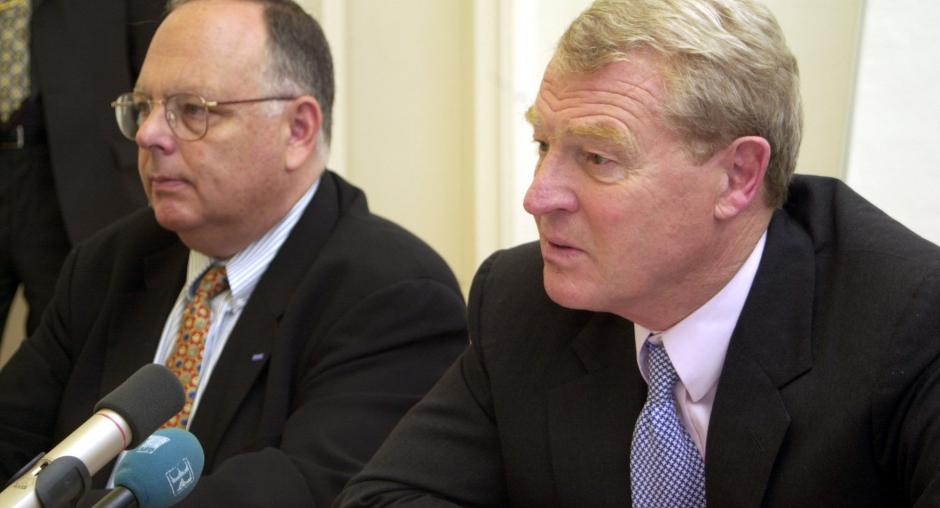Newsroom
Bosnia High Representative urges OSCE to take lead on education
VIENNA 4 July 2002

(Ayhan Evrensel/OSCE)High Representative for Bosnia and
Herzegovina, Lord Ashdown (right),
and Head of the OSCE Mission,
Ambassador Beecroft, speaking to the
press, 4 July 2002. (Ayhan Evrensel/OSCE) Photo details
VIENNA, 4 July 2002 - Lord Ashdown, High Representative and European Union Special Representative for Bosnia and Herzegovina, described the crisis in education as the biggest long-term threat to the country's security and stability on Thursday and urged the OSCE to take the lead in reforming the education system.
Addressing the OSCE Permanent Council in Vienna, he said the crisis in education was causing "a terrible haemorrhage of the young and talented" from the country which it was essential to halt.
"The current state of education in Bosnia and Herzegovina represents a serious obstacle to stability, security, reconciliation, institution-building, sustainable refugee returns and economic recovery," Lord Ashdown said. Education was widely used as an ideological and political tool to reinforce ethnic bias, intolerance, segregation and discrimination.
"The OSCE has the necessary expertise, political clout and respect among government authorities and parliaments at all levels in Bosnia and Herzegovina to be able to lead and work with all partner organisations to provide the field dimension and political support necessary," the High Representative added.
"No organisation in Bosnia and Herzegovina other than the OSCE has the mandate and therefore is in a position to take the lead on education."
Lord Ashdown suggested that the 55-nation OSCE should develop a strategy and field structure to ensure the application of minimum education standards, work with Bosnian and international partners to create a functional legal and institutional framework to ensure equal access to quality schools and promote multi-ethnic education and continue modernisation and quality-enhancement programmes.
Ambassador Robert Beecroft, Head of the OSCE Mission to Bosnia and Herzegovina, said supporting the young people of the country was a top priority for the Mission.
"Currently, young people in Bosnia and Herzegovina are frustrated," he told the Permanent Council. "Many have become apathetic. As a result they abstain from civic and political engagement. Instead, they are seeking ways to emigrate - a prospect that jeopardises Bosnia and Herzegovina's very future."
The OSCE Mission was working hard to help young people make their voices heard.
Ambassador Beecroft said transferring responsibility from international organisations to the citizens of Bosnia and Herzegovina remained of paramount importance. "However, this concept is still fragile and incomplete," he said. "Much will be affected by the choices voters make on October 5 (in general elections). The Mission will continue to work with its partners to develop an environment in which a stable government can lead its citizens decisively towards Europe."
Addressing the OSCE Permanent Council in Vienna, he said the crisis in education was causing "a terrible haemorrhage of the young and talented" from the country which it was essential to halt.
"The current state of education in Bosnia and Herzegovina represents a serious obstacle to stability, security, reconciliation, institution-building, sustainable refugee returns and economic recovery," Lord Ashdown said. Education was widely used as an ideological and political tool to reinforce ethnic bias, intolerance, segregation and discrimination.
"The OSCE has the necessary expertise, political clout and respect among government authorities and parliaments at all levels in Bosnia and Herzegovina to be able to lead and work with all partner organisations to provide the field dimension and political support necessary," the High Representative added.
"No organisation in Bosnia and Herzegovina other than the OSCE has the mandate and therefore is in a position to take the lead on education."
Lord Ashdown suggested that the 55-nation OSCE should develop a strategy and field structure to ensure the application of minimum education standards, work with Bosnian and international partners to create a functional legal and institutional framework to ensure equal access to quality schools and promote multi-ethnic education and continue modernisation and quality-enhancement programmes.
Ambassador Robert Beecroft, Head of the OSCE Mission to Bosnia and Herzegovina, said supporting the young people of the country was a top priority for the Mission.
"Currently, young people in Bosnia and Herzegovina are frustrated," he told the Permanent Council. "Many have become apathetic. As a result they abstain from civic and political engagement. Instead, they are seeking ways to emigrate - a prospect that jeopardises Bosnia and Herzegovina's very future."
The OSCE Mission was working hard to help young people make their voices heard.
Ambassador Beecroft said transferring responsibility from international organisations to the citizens of Bosnia and Herzegovina remained of paramount importance. "However, this concept is still fragile and incomplete," he said. "Much will be affected by the choices voters make on October 5 (in general elections). The Mission will continue to work with its partners to develop an environment in which a stable government can lead its citizens decisively towards Europe."
